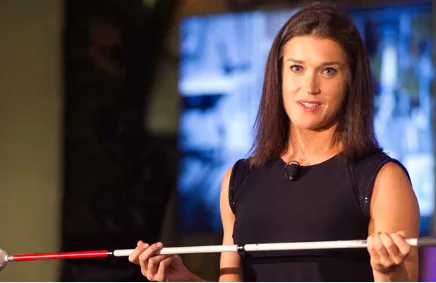Owning her vision loss: Rebecca Alexander’s story
Rebecca Alexander chooses to see each day as a gift. Having experienced both vision and hearing loss, Rebecca is a dedicated advocate, bringing encouragement and determination to the vision- and hearing-impaired communities.

Rebecca was clinically diagnosed with retinitis pigmentosa (RP) at age 12. To her and her family’s frustration, research and information about the condition was limited throughout her teenage years. “I used to hide or lie about my progressing vision and hearing loss,” Rebecca said of her days as a student. While attending the University of Michigan, she began to experience problems with hearing that prompted her to schedule an appointment with her healthcare professional. It was then that Rebecca’s initial RP diagnosis was clarified. Her vision and hearing loss were more specifically symptoms of Usher syndrome, a rare genetic condition that encompasses RP.
Even though Rebecca’s clinical diagnosis explained her symptoms, new questions arose. Rebecca recalls that the new diagnosis confused her healthcare team too: “They told me that I had Usher syndrome, but that they’d never seen it as it presented itself in me. They couldn’t tell me what type it was.” Rebecca’s family pursued genetic testing, and their blood work proved to be the missing link that identified a new form of Usher syndrome — type III. Genetic testing led to the discovery of Usher syndrome type III, offering clarity and information for Rebecca and others who cope with the confusion and uncertainty of misdiagnosis associated with these symptoms.
Usher syndrome is the leading genetic cause of combined deafness and blindness and more than 400,000 people are living with it worldwide, but only a fraction of this population has had their specific mutation or type identified. Having genetic testing done does not mean that a person has to take any further actions, but it gives individuals the option should they want to.
“When we found out that my gene mutation had been discovered, my mom and I were on the phone, and we cried. It was so miraculous to have an official diagnosis. And to have a genetic understanding of how this came to be meant that our research could really start to happen,” she said. Having a definitive diagnosis ignited a greater sense of hope, and this hope also provided Rebecca and her family with a starting point where they could find more information, connect with specific communities, and make better informed decisions about a course of disease management.
It was so miraculous to have an official diagnosis. And to have a genetic understanding of how this came to be meant that our research could really start to happen
Rebecca sets goals with determination and chooses to see potential barriers as challenges to overcome. For example, her reservations about using a cane were initially a hurdle to overcome, until practice showed her that walking with a cane gives people living with vision impairment a lot of valuable information and can give them a renewed sense of independence too. Rebecca also gives herself permission to feel the emotions that come with vision and hearing loss associated with Usher syndrome. On days when challenges feel tougher than normal, Rebecca asks people for help when she needs it.
“An important part of asking for help from other people is that you’re enlisting them, and you’re letting them know that they matter. There’s nothing people want to know more in this world than that they matter,” she said.
Rebecca’s journey with Usher syndrome has given her a strong desire to find others and build a sense of community through her work as a psychotherapist, author, group fitness instructor, and extreme athlete. At the International Usher Syndrome Symposium in Germany this past summer, Rebecca met a family who had traveled a long way just to connect with her over shared experiences of her rare subtype of the genetic disease. Having a platform on which Rebecca can share a positive story born from challenging circumstances gives a voice to and represents the individuals who dream of accomplishing some of the feats she has – summitting Mt. Kilimanjaro, skydiving, and bungee jumping to name a few.
“Part of my process has been just owning it.” And part of just owning it is advocating for yourself for an official diagnosis. With her strength of spirit, Rebecca encourages others to do the same.
Sign up to find out when we add new stories to the site.
